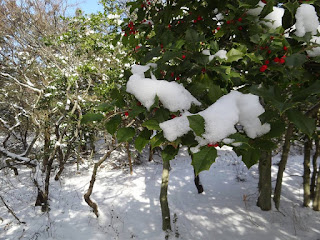December’s Species of the Month, like last December’s,
is a living symbol of Christmas. Holly, with its green leaves and red berries,
has become of a jolly symbol of the most wonderful time of the year. The
Species of the Month is American holly, native to the eastern US and lower
Midwest.
Scientific name: Ilex
opaca
Kingdom: Plantae (plants)
Class: Magnoliopsida
(dicots)
Order: Celastrales (flowering trees)
Range: New York and southern New England south to the
Gulf Coast, west to Texas
Habitat: Well-drained forests, coastal areas
Lifespan: About 100 years
Diet: Sunlight and water
Predators: Insects including southern red mite, holly
leafminer, and holly midge; fungal diseases; birds may eat the berries and
herbivores may browse the leaves.
Conservation Status: No federal protection; listed as
Exploitably Vulnerable in New York and Threatened in Pennsylvania.
 |
| Winter holly at Gateway National Recreation Area (NPS Facebook photo) |
Other Information: American holly is used as an
ornamental planting. Its branches are used in Christmas wreaths. The Pilgrims
named American holly, based on its similar looks to their familiar English holly,
which had been established as a Christmas decoration for some time. A slow grower, it is
typically an understory plant, although some have been known to reach 100 feet
tall. Because it is usually found in the understory, it is rarely the dominant
plant in a forest. However, an excellent example of a holly forest can be found
at Sandy Hook, New Jersey. Both male and female hollies flower, but only the
females produce berries. Birds are an important method of seed dispersal. Holly’s
wood is among the whitest woods on the market. It is not very strong so its
commercial use is limited. Small green flowers are hardly noticeable.
This week's holly information comes from the US Forest Service.
 |
| My 2016 Christmas card, featuring holly in my yard |
 |
| Coastal holly in North Carolina (NPS) |
 |
| More holly in New Jersey (NPS Facebook photo) |
No comments:
Post a Comment